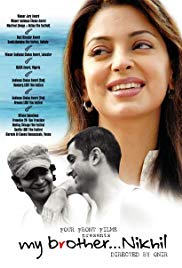
MY BROTHER… NIKHIL
India, 2005, 120 minutes, Colour.
Sanjay Suri, Juhi Chawli, Purab Kuhli, Victor Bannerjee, Lillette Dubey, Gautam Kapoor.
Directed by Onir.
This film has a reputation for being the first Indian film to deal with issues of homosexual orientation – released in 2005 and, so, rather reticent in the dramatisation compared with films coming soon after, in language, sexual reference, dramatising behaviour. This can be seen in further films including Loev, and the quite effective drama, Evening Shadows.
The film is based on actual characters, a swimmer in Goa. Names have been changed.
The film uses the device of interviews with members of the family and friends, talking to camera, which is quite effective and draws the audience into understanding and some sympathy.
The film has many flashbacks to Nikhil and his sister who is one of the key narrators. They have a playful childhood, a devoted mother, a somewhat stern patriarchal father. Nikhil is successful in swimming, winning competitions, pleasing his father. However, again in a rather reticent seen, he goes to see a doctor who warns him about the diagnosis of a blood disease – not immediately spelling out that Nikhil is HIV Positive. He is put down from the swimming team, become suspicious around the city, his parents are ridiculed when they go out to dinner.
There have been a number of films about the early years of HIV and AIDS – from various countries and cultures. Indian culture, which has had legislation against homosexuality, does not have the awareness of how to deal with the new infection in the 1980s and 1990s. An interesting comparison would be to look at the Australian film, Holding the Man, where the central character dies in 1992 and his parents wanted to be known that he died of cancer at the time of his funeral.
Nikhil is arrested, confined to rather squalid surroundings, subject to rough treatment as well as ridicule by the authorities. His sister consults a lawyer who then takes up a campaign as to the sister and Nikhil’s boyfriend, Nigel. They are supported by the school principal and new kill is freed.
The interviews move from the late 1980s into the early 1990s and back and forth. His parents want no contact with their son. His sister and her husband are very supportive as is Nigel. However, Nikhil’s health deteriorates and he suffers from AIDS. Eventually, his parents returned from Mumbai after several years to Goa. His mother does come to visit him, his father not. However, there is some ultimate reconciliation and Nikhil is welcome to live with his parents until he dies.
The film notes that the sister and Nigel continue to work for organisations helping those who are HIV.
The film has quite an emotional pull – but is a strong reminder, in the context of India, of initial reactions to and fears of HIV and AIDS.